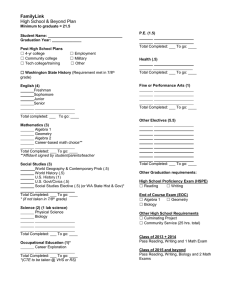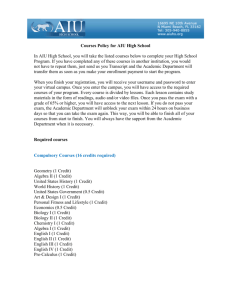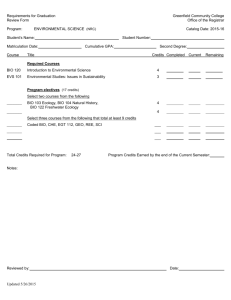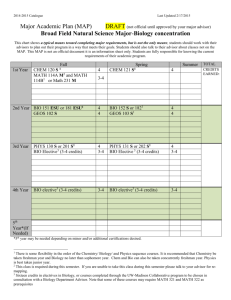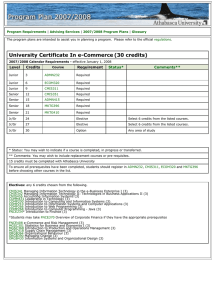SUNY - ESF - Curriculum Plan Sheet Page 1
advertisement
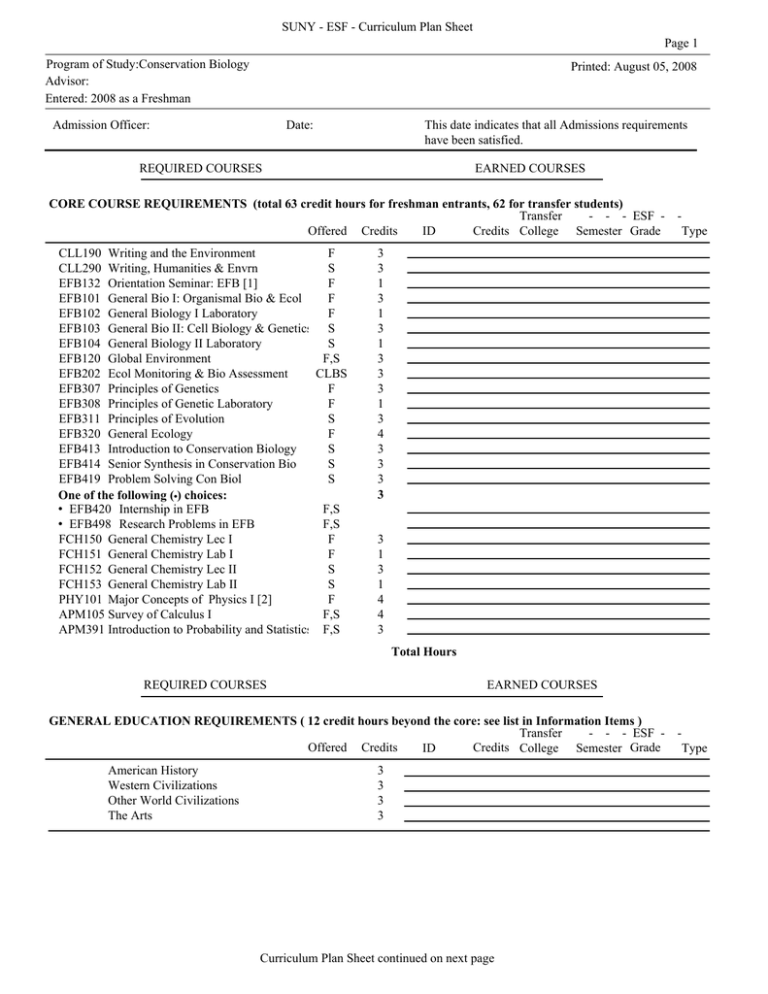
SUNY - ESF - Curriculum Plan Sheet Page 1 Program of Study:Conservation Biology Advisor: Entered: 2008 as a Freshman Printed: August 05, 2008 Admission Officer: Date: This date indicates that all Admissions requirements have been satisfied. REQUIRED COURSES EARNED COURSES CORE COURSE REQUIREMENTS (total 63 credit hours for freshman entrants, 62 for transfer students) Transfer - - - ESF Offered Credits Credits College Semester Grade ID CLL190 Writing and the Environment CLL290 Writing, Humanities & Envrn EFB132 Orientation Seminar: EFB [1] EFB101 General Bio I: Organismal Bio & Ecol EFB102 General Biology I Laboratory EFB103 General Bio II: Cell Biology & Genetics EFB104 General Biology II Laboratory EFB120 Global Environment EFB202 Ecol Monitoring & Bio Assessment EFB307 Principles of Genetics EFB308 Principles of Genetic Laboratory EFB311 Principles of Evolution EFB320 General Ecology EFB413 Introduction to Conservation Biology EFB414 Senior Synthesis in Conservation Bio EFB419 Problem Solving Con Biol One of the following () choices: EFB420 Internship in EFB EFB498 Research Problems in EFB FCH150 General Chemistry Lec I FCH151 General Chemistry Lab I FCH152 General Chemistry Lec II FCH153 General Chemistry Lab II PHY101 Major Concepts of Physics I [2] APM105 Survey of Calculus I APM391 Introduction to Probability and Statistics F S F F F S S F,S CLBS F F S F S S S F,S F,S F F S S F F,S F,S Type 3 3 1 3 1 3 1 3 3 3 1 3 4 3 3 3 3 3 1 3 1 4 4 3 Total Hours REQUIRED COURSES EARNED COURSES GENERAL EDUCATION REQUIREMENTS ( 12 credit hours beyond the core: see list in Information Items ) Transfer - - - ESF Offered Credits Credits College Semester Grade ID American History Western Civilizations Other World Civilizations The Arts 3 3 3 3 Curriculum Plan Sheet continued on next page Type SUNY - ESF - Curriculum Plan Sheet Page 2 Program of Study:Conservation Biology Advisor: Entered: 2008 as a Freshman Printed: August 05, 2008 DIRECTED ELECTIVE COURSES ( 30 credit hours ) Transfer Credits College ID - - - ESF Semester Grade Type Total Hours DIRECTED ELECTIVES (30 credits) A. Field Experience Elective NOT YET MET B. Organismal Diversity (at least one course from 3 of the following 4 subject areas) 1. Diversity of Microorganisms NOT YET MET 2. Diversity of Plants NOT YET MET 3. Diversity of Invertebrate Animals NOT YET MET 4. Diversity of Vertebrate Animals NOT YET MET C. Applied Conservation Biology (at least 6 credits) NOT YET MET D. Human Dimensions (at least 3 credits) NOT YET MET E. Communications and Interpretation (at least 3 credits) NOT YET MET F. Technical Skills (at least 3 credits) NOT YET MET OPEN ELECTIVES ( 21 credit hours available; 22 for transfer students) Transfer Credits College ID - - - ESF Semester Grade Type Total Hours SUMMARY Required: Earned: In Progress: Deficient: 126 0 0 0 FOOTNOTES [1] Transfer students instead take ESF332 Seminar for New Transfer Students (0 credits). [2] Physics 211 and 221 (taken together) will also satisfy this requirement. INFORMATION ITEMS TYPICAL SCHEDULE Freshman year Curriculum Plan Sheet continued on next page SUNY - ESF - Curriculum Plan Sheet Page 3 Program of Study:Conservation Biology Advisor: Entered: 2008 as a Freshman Freshman year Fall EFB101 EFB102 FCH150 FCH151 APM105 CLL190 EFB132 Spring EFB103 EFB104 FCH152 FCH153 Printed: August 05, 2008 General Bio I: Organismal Bio & Ecol General Biology I Laboratory General Chemistry Lec I General Chemistry Lab I Survey of Calculus I Writing and the Environment Orientation Seminar: EFB Total Credits 3 1 3 1 4 3 1 16 General Bio II: Cell Biology & Genetics General Biology II Laboratory General Chemistry Lec II General Chemistry Lab II Elective Total Credits 3 1 3 1 6 14 Summer EFB202 Ecol Monitoring & Bio Assessment SUMMFE Field Elective Total Credits Sophomore year Fall PHY101 Major Concepts of Physics I EFB307 Principles of Genetics EFB308 Principles of Genetic Laboratory EFB320 General Ecology Elective Total Credits Spring EFB311 Principles of Evolution CLL290 Writing, Humanities & Envrn EFB120 Global Environment APM391 Introduction to Probability and Statistics Elective Total Credits Junior year Fall ELECT Directed Electives in Conservation Biology Elective Total Credits Spring EFB413 Introduction to Conservation Biology EFB419 Problem Solving Con Biol ELECT Directed Electives in Conservation Biology Total Credits Senior year Fall ELECT Directed Electives in Conservation Biology Total Credits Spring EFB414 Senior Synthesis in Conservation Bio ELECT Directed Electives in Conservation Biology Elective 3 3 6 4 3 1 4 3 15 3 3 3 3 3 15 12 3 15 3 3 9 15 15 15 3 9 6 Curriculum Plan Sheet continued on next page SUNY - ESF - Curriculum Plan Sheet Page 4 Program of Study:Conservation Biology Advisor: Entered: 2008 as a Freshman Printed: August 05, 2008 Senior year Total Credits 18 GENERAL EDUCATION COURSES ( in areas not covered by core courses). These are the approved ESF courses. A full list, including those offered at Syracuse University, is available from the ESF catalog ( http://www.esf.edu/registrar/catalog/). See also ESF Registrar's webpage for current Gen Ed offerings (http://www.esf.edu/registrar/). AMERICAN HISTORY EST201 American History: Reconstruction to Present S EST361 History/Am Envrn Movement (3 cr.) F FOR204 Natural Resources in American History F WESTERN CIVILIZATION EIN471 History of Landscape Arch (3 cr.) S FOR203 Western Civilization&the Envrn (3 cr.) S OTHER WORLD CIVILIZATIONS EST200 Cultural Ecology (3 cr.) S THE ARTS EFB215 LSA182 LSA205 LSA206 PSE201 Interpreting Science Through Art F Drawing Studio (3 cr.) F Art,Culture&Landscape I (3 cr.) F Art,Culture&Landscape II (3 cr.) S Art &Early History/Papermaking American History - EIN 371, EST 361, and ETS 116 are only for students scoring above 84 on the U.S. History Regents examination. DIRECTED ELECTIVES (30 credits) To ensure that Conservation Biology undergraduates obtain both strength and breadth of knowledge, 30 elective credit hours must be distributed in a way that satisfies seven requirements (A-F, below). A. Field Experience Elective At least three elective credits must come from an approved field course in biology, either at Cranberry Lake Biological Station or another approved field site. B. Organismal Diversity (at least one course from 3 of the following 4 subject areas) To encourage breadth in organism-level biology, students must complete at least one course from three of the following four subject areas (a course from each group is strongly recommended). The availability of courses that satisfy this requirementvaries; consult with your advisor about current possibilities. 1. Diversity of Microorganisms EFB303 EFB340 EFB342 EFB440 EFB441 EFB443 Introductory Environmental Microbiology (4 cr.) F Forest and Shade Tree Pathology (3 cr.) S Fungal Diversity and Ecology (3 cr.) CLBS Mycology (3 cr.) F Field Plant Pathology (3 cr.) CLBS Plant Virology (3 cr.) S Curriculum Plan Sheet continued on next page SUNY - ESF - Curriculum Plan Sheet Page 5 Program of Study:Conservation Biology Advisor: Entered: 2008 as a Freshman Printed: August 05, 2008 2. Diversity of Plants EFB326 EFB327 EFB336 EFB446 EFB535 Diversity of Plants (3 cr.) S Adirondack Flora (3 cr.) CLBS Dendrology (3 cr.) F Ecology of Mosses (3 cr.) S Systematic Botany (3 cr.) F 3. Diversity of Invertebrate Animals EFB351 EFB352 EFB355 EFB554 Principles of Forest Entomology (3 cr.) S Elements of Entomology (3 cr.) F Invertebrate Zoology (4 cr.) S Aquatic Entomology (3 cr.) F 4. Diversity of Vertebrate Animals EFB384 EFB388 EFB479 EFB482 EFB483 EFB485 EFB486 Field Herpology (3 cr.) CLBS Ecology of Adirondack Fisheries (3 cr.) CLBS Field Ornithology (3 cr.) CLBS Ornithology (4 cr.) F Mammal Diversity (3 cr.) S Herpetology (3 cr.) F Ichthyology (3 cr.) S C. Applied Conservation Biology (at least 6 credits) EFB390 EFB444 EFB493 EFB502 EFB522 EFB542 Wildlife Ecology and Management (4 cr.) Biodiversity and Geography of Nature (3 cr.) F Management of Wildlife Habitats & Populations (3 cr.) F Ecology and Management of Invasive Species (3 cr.) F Ecology, Resources and Development (2 cr.) S Freshwater Wetland Ecosystems (3 cr.) S D. Human Dimensions (at least 3 credits) CLL390 CMN393 EFB404 EFB405 EST353 EST366 EST390 EST496 FOR312 FOR360 FOR465 FOR542 Intro to Literature of Nature (3 cr.) F Enviorn Discourse (3 cr.) F Nat Hist Museums of Modern Sci (3 cr.) S Literature of Natural History (3 cr.) S Environ Psychology (3 cr.) S Attitudes, Values, & Env. (3 cr.) S Social Processes and Environment (3 cr.) S Land Use Law (3 cr.) S Sociology/Natural Resources (3 cr.) S Principles of Management (3 cr.) F Natural Resources and Environ. Policy (3 cr.) F Watershed Management (3 cr.) F E. Communications and Interpretation (at least 3 credits) CLL405 EFB416 EFB417 EFB521 Writing for Science Professionals (3 cr.) F,S Intro. Environmental Intrepretation (3 cr.) Perspectives in Interpretive Design (3 cr.) Principles of Interpretive Programming (3 cr.) Curriculum Plan Sheet continued on next page SUNY - ESF - Curriculum Plan Sheet Page 6 Program of Study:Conservation Biology Advisor: Entered: 2008 as a Freshman Printed: August 05, 2008 F. Technical Skills (at least 3 credits) APM360 BTC425 BTC426 EFB401 EFB518 EFB519 ENS550 ERE445 ESF300 ERE550 ERE563 Intro Computer Programming (3 cr.) F Plant Biotechnology (3 cr.) S Plant Tissue Culture Methods (3 cr.) F Molecular Biol. Techniques (3 cr.) S System Ecology (4 cr.) F Geographic Modeling (3 cr.) S Environ Impact Analysis (3 cr.) F Hydrological Modeling (3 cr.) F Introduction to Geospatial Information Technology (3 cr.) F Intro Geographic Information Systems (3 cr.) F Photogrammetry (3 cr.) S HOW TO READ THIS PLAN SHEET Student must match "required courses" with "earned courses" in order to satisfy curriculum requirements. Required courses are derived from the SUNY- ESF Course Catalog for the appropriate year. Earned courses may be a combination of ESF courses and transfer courses, including advanced placement credit. The requirements are split between lower and upper division, and the "summaries" display the total credit hours required, earned, and deficient in each division. "ID" refers to the Course ID, which may be an official College course ID or an abbreviation for a transfer course or course requirement. Transfer courses will refer to the number of a transfer college identified at the top of the plan sheet. Courses taken at ESF will display the semester taken and the grade received. "Semester" - term and year in which course was taken: FA - Fall term SP - Spring term SU - Summer term "Type" of Course IP - course in progress Memo - credit added via memo Petn - credit added via petition This report has been prepared to assist you in determining your academic progress at ESF. If this report does not appear to be accurate, contact your academic advisor and bring this report with you. Please be advised: final confirmation that you have met all degree requirements is subject to approval by your Faculty Chair and the Registrar. CERTIFIED FOR Hours: GPA: Registrar Date Faculty Chair/ Designee Date End of Curriculum Plan Sheet


